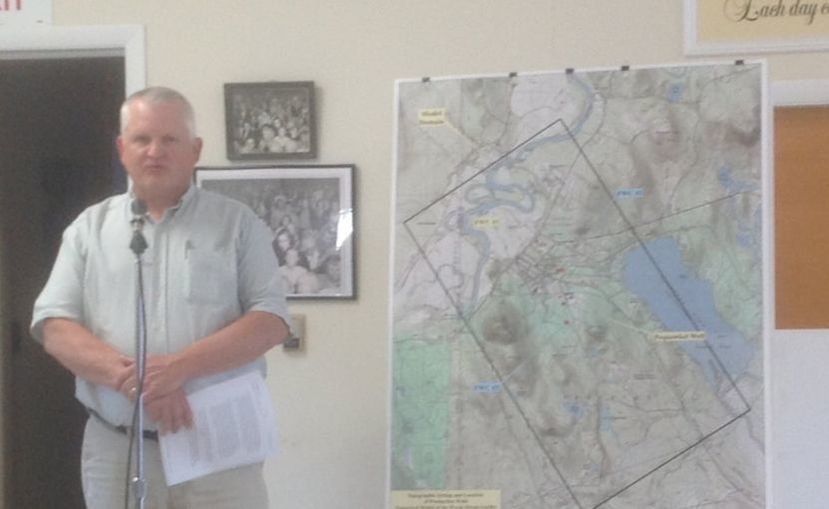Emery & Garrett Geological Inquiries has been employed by the Fryeburg Select Board to review their model using more recent and longer data sets to see if their predictions from the original 2005 study can be verified. But before the study review begins in earnest, the Select Board wanted to know what they are getting for $34,000 raised.
As Hydrogeologist Dan Tinkham rose to begin his presentation, Select Board chairman, Rick Eastman announced to the attending crowd that no question would be entertained until the completion of the study, at the as yet unknown date. He assure the public more than once at this meeting that a public forum would be held to allow questions at the end of the study (projected in the Spring of 2019).
Mr. Tinkham then proceeded to explain how new data has already been entered into the model, as well as worst case scenarios of heavy extraction and severe drought. Mr. Tinkam was able to show that at current rates of extraction and rainfall, Ward's Brook Aquifer would continue to have enough hydraulic pressure to feed the spring at Well #1 as well as Ward's Pond and Brook. Only in the most severe conditions did he suggest that Ward's Pond, and likely the Brook which flows from there to Lovewell Pond, would suffer.
What Mr. Tinkham did not say however, was as notable as what he did. His presentation was aimed at the possibility of reduced water levels, of great interest to the water extraction industry. He did not however speak to the environmental impacts on Ward's Brook, Ward's Pond, Round Pond or even Lovewell Pond, all of which are fed by WBA. These concerns were shut out of the study and even the discussion of study parameters.
Two major barriers remain to fully understanding the impacts on connected wetlands. 1) The sandy bottom of Ward's Brook does not allow for accurate staff gauge measurements and 2) Maine Inland Fisheries will not allow a weir to be constructed where aquatic life must pass. Though the public is clearly concerned about the environmental impact excluded from the study, the Select Board did not agree to move forward on the recommendations that a biologist be employed to assess environmental impacts or even review the Normandeau study done in 2007.
Mr. Tinkham's presentation was professional and engaging, despite his assumption that we would not find it as interesting as he. However, his study is limited by the Select Board and his science is yet unchecked by peer review. Can we believe him? I'd like to, but many questions remain.
Greg Huang-Dale, FWD chair
As Hydrogeologist Dan Tinkham rose to begin his presentation, Select Board chairman, Rick Eastman announced to the attending crowd that no question would be entertained until the completion of the study, at the as yet unknown date. He assure the public more than once at this meeting that a public forum would be held to allow questions at the end of the study (projected in the Spring of 2019).
Mr. Tinkham then proceeded to explain how new data has already been entered into the model, as well as worst case scenarios of heavy extraction and severe drought. Mr. Tinkam was able to show that at current rates of extraction and rainfall, Ward's Brook Aquifer would continue to have enough hydraulic pressure to feed the spring at Well #1 as well as Ward's Pond and Brook. Only in the most severe conditions did he suggest that Ward's Pond, and likely the Brook which flows from there to Lovewell Pond, would suffer.
What Mr. Tinkham did not say however, was as notable as what he did. His presentation was aimed at the possibility of reduced water levels, of great interest to the water extraction industry. He did not however speak to the environmental impacts on Ward's Brook, Ward's Pond, Round Pond or even Lovewell Pond, all of which are fed by WBA. These concerns were shut out of the study and even the discussion of study parameters.
Two major barriers remain to fully understanding the impacts on connected wetlands. 1) The sandy bottom of Ward's Brook does not allow for accurate staff gauge measurements and 2) Maine Inland Fisheries will not allow a weir to be constructed where aquatic life must pass. Though the public is clearly concerned about the environmental impact excluded from the study, the Select Board did not agree to move forward on the recommendations that a biologist be employed to assess environmental impacts or even review the Normandeau study done in 2007.
Mr. Tinkham's presentation was professional and engaging, despite his assumption that we would not find it as interesting as he. However, his study is limited by the Select Board and his science is yet unchecked by peer review. Can we believe him? I'd like to, but many questions remain.
Greg Huang-Dale, FWD chair


 RSS Feed
RSS Feed